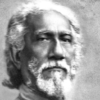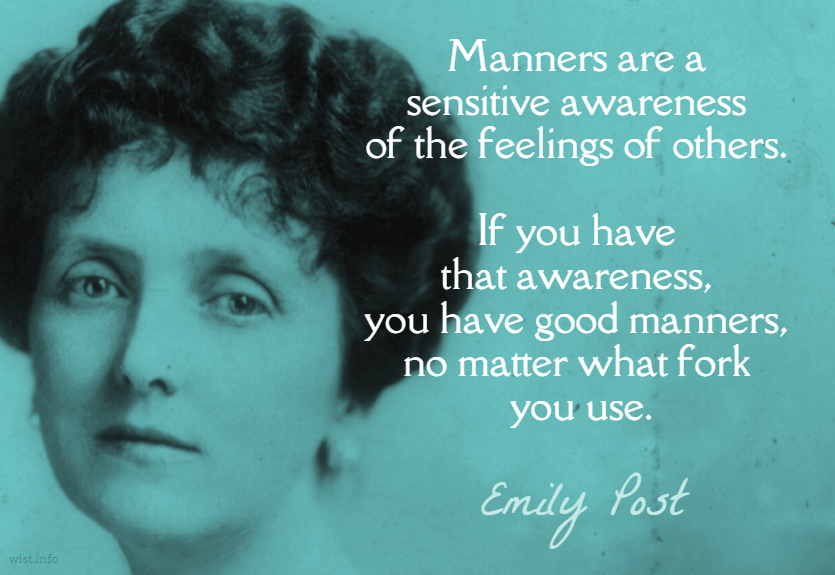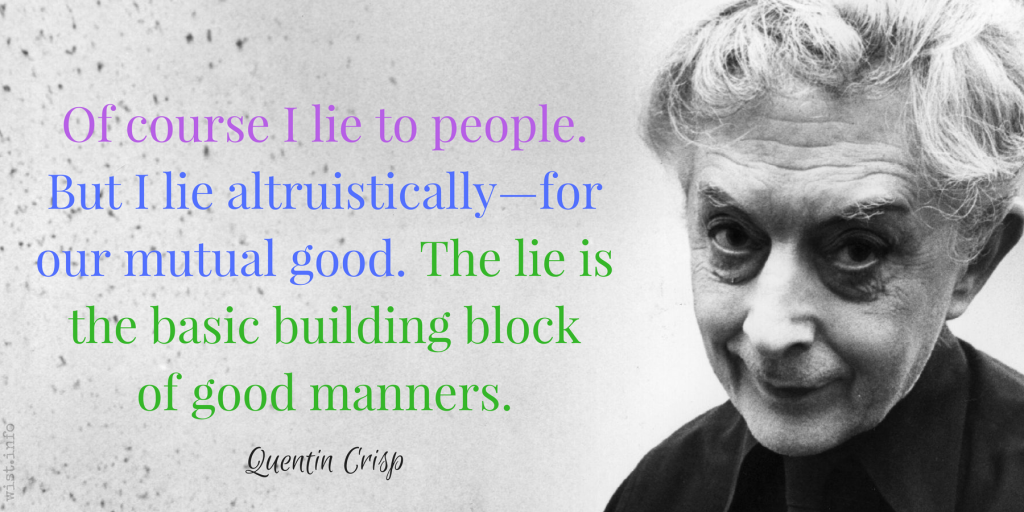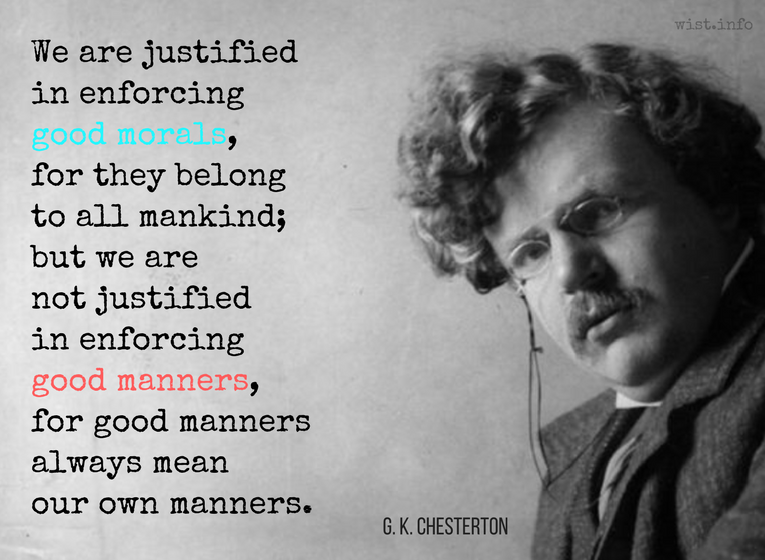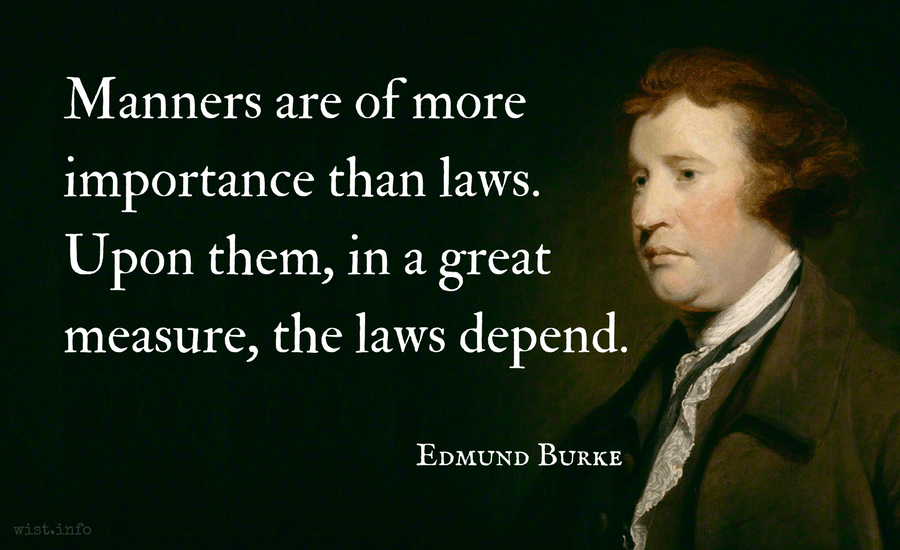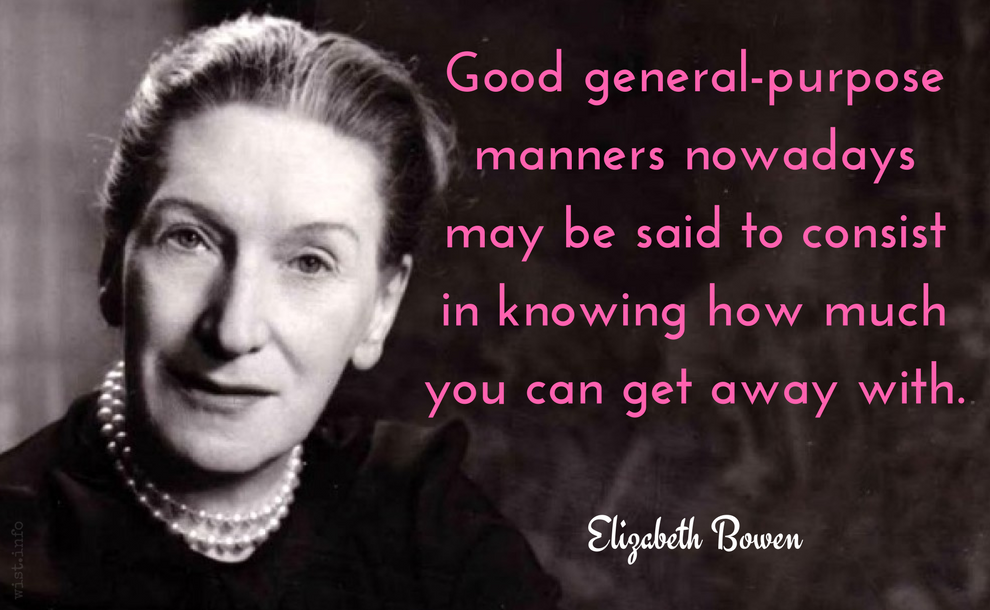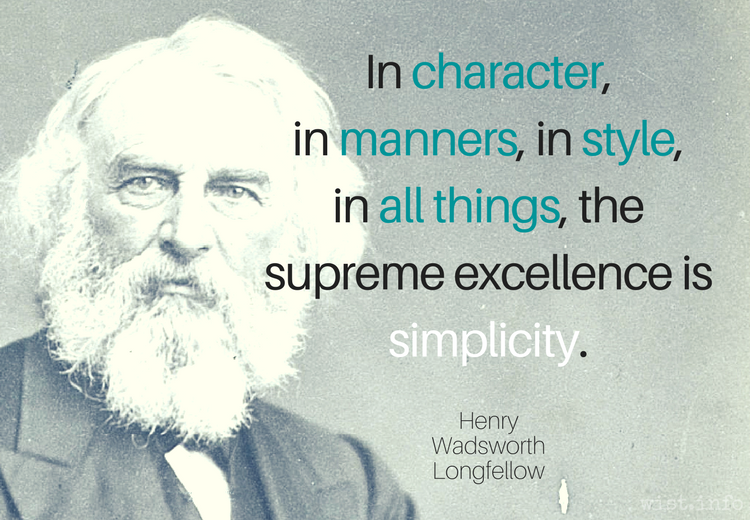The rationale that etiquette should be eschewed because it fosters inequality does not ring true in a society that openly admits to a feverish interest in the comparative status-conveying qualities of sneakers. Manners are available to all, for free.
Judith Martin (b. 1938) American author, journalist, etiquette expert [a.k.a. Miss Manners]
Common Courtesy, “On Etiquette as Language, Weapon, Custom, and Craft” (1985)
(Source)
Quotations about:
manners
Note not all quotations have been tagged, so Search may find additional quotes on this topic.
Civilization has taught us to eat with a fork, but even now if nobody is around we use our fingers.
All the higher animals have methods of expressing pleasure, but human beings alone express pleasure when they do not feel it. This is called politeness and is reckoned among the virtues.
Bertrand Russell (1872-1970) English mathematician and philosopher
“On smiling,” New York American (1932-08-17)
(Source)
The object of what we call deportment and good manners is to attain that which can otherwise be attained only by force or not even by force.
[Durch das, was wir Betragen und gute Sitten nennen, soll das erreicht werden, was außerdem nur durch Gewalt, oder auch nicht einmal durch Gewalt zur erreichen ist.]
Johann Wolfgang von Goethe (1749-1832) German poet, statesman, scientist
Elective Affinities [Die Wahlverwandtschaften], Part 2, ch. 5, “From Ottilie’s Journal [Aus Ottiliens Tagebuche]” (1809) [tr. Hollingdale (1971)]
(Source)
(Source (German)). Alternate translation:
That which we call politeness and good breeding effects what otherwise can only be obtained by violence, or not even that.
[Niles ed. (1872)]
Evil communication corrupts good manners. I hope to live to hear that good communication corrects “bad manners.”
Benjamin Banneker (1731-1806) American naturalist, surveyor, almanac author, mathematician
Handwritten note in one of his almanacs
(Source)
Quoted in Friends' Intelligencer, vol. 11 (1854).
Manners consist in pretending that we think as well of others as of ourselves. Manners are necessary because, as a rule, there is a pretence; when our good opinion of others is genuine, manners look after themselves. Perhaps instead of teaching manners, parents should teach the statistical probability that the person you are speaking to is just as good as you are. It is difficult to believe this; very few of us do, in our instincts, believe it. One’s own ego seems so incomparably more sensitive, more perceptive, wiser and more profound than other people’s. Yet there must be very few of whom this is true, and it is not likely that oneself is one of those few. There is nothing like viewing oneself statistically as a means both to good manners and to good morals.
Bertrand Russell (1872-1970) English mathematician and philosopher
“On Being Insulting,” New York American (1934-12-21)
(Source)
It is therefore not true that against nature there is neither rein nor master. On the contrary, there are two of them: one is good manners, the other reason.
[Non è adunque vero che incontro alla natura non abbia freno né maestro: anzi ve ne ha due, ché l’uno è il costume e l’altro è la ragione.]
Giovanni della Casa (1503-1556) Florentine poet, author, diplomat, bishop
Galateo: Or, A Treatise on Politeness and Delicacy of Manners [Il Galateo overo de’ costumi], ch. 25 (1558) [tr. Eisnbichler/Bartlett (1986)]
(Source)
(Source (Italian)). Alternate translations:
It is not then true, that there is not a bridell and Master for Nature, Nay, she is guided and ruled by twaine: Custome I meane, and Reason.
[tr. Peterson (1576)]
Which being so, it is not true, that we are not furnished with reins, or a proper guide against the impetuosity of our nature: for we have two; one of which is Experience, and the other right Reason.
[tr. Graves (1774)]
Good manners without sincerity are like a beautiful dead lady.
Sri Yukteswar Giri (1855-1936) Indian monk, yogi, guru [श्रीयुक्तेश्वर गिरि, b. Priya Nath Karar]
In Paramahansa Yogananda, Autobiography of a Yogi, ch. 12 (1946)
(Source)
But remember, that manners must adorn knowledge, and smooth its way through the world. Like a great rough diamond, it may do very well in a closet by way of curiosity, and also for its intrinsic value; but it will never be worn, nor shine, if it is not polished.
Lord Chesterfield (1694-1773) English statesman, wit [Philip Dormer Stanhope]
Letter to his son, #155 (1 Jul 1748)
(Source)
For tho’ it is certainly more laudable, and a thing of greater moment, to be generous, constant, and magnanimous, than merely to be polite and well bred; yet we find, from daily experience, that sweetness of manners, a genteel carriage, and, polite address are frequently of more advantage to those who are so happy as to be possessed of them, than any greatness of soul or brightness of parts are to those who are adorned with those more shining talents.
[E come che l’esser liberale o constante o magnanimo sia per sé sanza alcun fallo più laudabil cosa e maggiore che non è l’essere avenente e costumato, non di meno forse che la dolcezza de’ costumi e la convenevolezza de’ modi e delle maniere e delle parole giovano non meno a’ possessori di esse che la grandezza dell’animo e la sicurezza altresì a’ loro possessori non fanno.]
Giovanni della Casa (1503-1556) Florentine poet, author, diplomat, bishop
Galateo: Or, A Treatise on Politeness and Delicacy of Manners [Il Galateo overo de’ costumi], ch. 1 (1558) [tr. Graves (1774)]
(Source)
(Source (Italian)). Alternate translations:
And albeit Liberalitie, or magnanimitie, of themselves beare a greater praise, then, to be a well taught or manored man: yet perchaunce, the courteous behaviour and entertainement with good maners and words, helpe no lesse, him that hath them: then the high minde and courage, advaunceth him in whome they be.
[tr. Peterson (1576)]
Although liberality, courage, or generosity are without doubt far greater and more praiseworthy things than charm and manners, none the less, pleasant habits and decorous manners and words are perhaps no less useful to those who have them than a noble spirit and self-assurance are to others.
[tr. Einsenbichler/Bartlett (1986)]
You ought to regulate your manner of behaviour towards others, not according to your own humour, but agreeably to the pleasure and inclination of those with whom you converse.
[Il che acciò che tu più agevolmente apprenda di fare, dèi sapere che a te convien temperare et ordinare i tuoi modi non secondo il tuo arbitrio, ma secondo il piacer di coloro co’ quali tu usi, et a quello indirizzargli.]
Giovanni della Casa (1503-1556) Florentine poet, author, diplomat, bishop
Galateo: Or, A Treatise on Politeness and Delicacy of Manners [Il Galateo overo de’ costumi], ch. 2 (1558) [tr. Graves (1774)]
(Source)
(Source (Italian)). Alternate translations:
It behooves thee, to frame and order thy maners and doings, not according to thine owne minde and fashion: but to please those, with whome thou livest, and after that sort direct thy doings.
[tr. Peterson (1576)]
You must know that it will be to your advantage to temper and adapt your manners not according to your own choices but according to the pleasure of those with whom you are dealing and act accordingly.
[tr. Einsenbichler/Bartlett (1986)]
The hardest lesson — and this is what child-rearing and perhaps all of manners is about — is that there are other people in the world and you do have to take their feelings into consideration. It doesn’t mean you always have to yield to them, but it does mean that you have to know how to deal with them. A lot of people know that they want to be treated politely, but they don’t make that little leap and say, Well, the other person must feel that way, too.
Judith Martin (b. 1938) American author, journalist, etiquette expert [a.k.a. Miss Manners]
In “Polite Company,” interview by Hara Estroff Marano, Psychology Today (1998-03)
(Source)
Sick cultures show a complex of symptoms such as you have named … but a dying culture invariably exhibits personal rudeness. Bad manners. Lack of consideration for others in minor matters. A loss of politeness, of gentle manners, is more significant than is a riot.
Never acquire the “all hands ’round” habit. Shake hands with your host, but a bow to the rest is sufficient.
Minna Antrim (1861-1950) American epigrammatist, writer
Don’ts for Bachelors and Old Maids (1908)
(Source)
Charming villains have always had a decided social advantage over well-meaning people who chew with their mouths open.
Judith Martin (b. 1938) American author, journalist, etiquette expert [a.k.a. Miss Manners]
Common Courtesy, “In the Quest for Equality, Civilization Itself Is Maligned” (1985)
(Source)
Originally published in The New Republic in 1984.
True is, that whilome that good poet sayd,
The gentle minde by gentle deeds is knowne:
For a man by nothing is so well bewrayd,
As by his manners.Edmund Spenser (c. 1552-1599) English poet
The Faerie Queene, Book 6, Canto 3, st. 1 (1589-96)
(Source)
Spender is referencing Chaucer's "Wife of Bath's Tale" in the Canterbury Tales: "he is gentil that doth gentil dedis."
The essence of good manners consists in making it clear that one has no wish to hurt. When it is clearly necessary to hurt, it must be done in such a way as to make it evident that the necessity is felt to be regrettable.
Bertrand Russell (1872-1970) English mathematician and philosopher
“Good Manners and Hypocrisy,” New York American (1934-12-14)
(Source)
Manners are a sensitive awareness of the feelings of others. If you have that awareness, you have good manners, no matter what fork you use.
Emily Post (1872-1960) American author, columnist [née Price]
(Attributed)
Often cited to her famous Etiquette in Society, in Business, in Politics, and at Home (1922), but not found in that work. Claimed as genuine by the Emily Post Institute.
Good manners are a combination of intelligence, education, taste, and style mixed together so that you don’t need any of those things.
P. J. O'Rourke (b. 1947) American humorist, editor
Modern Manners: An Etiquette Book for Rude People, ch. 1 (1984)
(Source)
Spiritual strength and passion, when accompanied by bad manners, only provoke loathing.
Friedrich Nietzsche (1844-1900) German philosopher and poet
The Will to Power, Part 1, “Critique of Religion,” Sec. 175 [tr. Ludovici] (1888)
(Source)
Good manners spring from just one thing — kind impulses.
Elsa Maxwell (1883-1963) American gossip columnist, author, songwriter, professional hostess
Elsa Maxwell’s Etiquette Book (1951)
(Source)
Good manners are made up of petty sacrifices.
Ralph Waldo Emerson (1803-1882) American essayist, lecturer, poet
“Social Aims,” lecture, Boston (1864-12-04), Letters and Social Aims (1875)
(Source)
Of course I lie to people. But I lie altruistically — for our mutual good. The lie is the basic building block of good manners. That may seem mildly shocking to a moralist — but then what isn’t?
Quentin Crisp (1908-1999) English writer and raconteur [b. Denis Pratt]
Manners from Heaven: A Divine Guide to Good Behavior (1984)
(Source)
We are justified in enforcing good morals, for they belong to all mankind; but we are not justified in enforcing good manners, for good manners always mean our own manners.
Gilbert Keith Chesterton (1874-1936) English journalist and writer
All Things Considered, “Limericks and Counsels of Perfection” (1908)
(Source)
Manners are of more importance than laws. Upon them, in a great measure, the laws depend. The law touches us but here and there, and now and then. Manners are what vex or soothe, corrupt or purify, exalt or debase, barbarize or refine us, but a constant, steady, uniform, insensible operation, like that of the air we breathe in. They give their whole form and color to our lives. According to their quality, they aid morals, they supply them, or they totally destroy them.
Edmund Burke (1729-1797) Anglo-Irish statesman, orator, philosopher
Letters on a Regicide Peace, Letter 1 (1796)
(Source)
Good general-purpose manners nowadays may be said to consist in knowing how much you can get away with.
I don’t mind if you don’t like my manners. They’re pretty bad. I grieve over them during the long winter evenings.
Raymond Chandler (1888-1959) American novelist
The Big Sleep, ch. 3 (1939)
(Source)
In the 1943 movie adaptation by William Faulkner, Leigh Brackett, and J. Furthman, the Phillip Marlowe line is delivered by Humphrey Bogart: "I don't mind if you don't like my manners. I don't like them myself. They're pretty bad. I grieve over them on long winter evenings."
Again, it is proper to the magnanimous person to ask for nothing, or hardly anything, but to help eagerly. When he meets people with good fortune or a reputation for worth, he displays his greatness, since superiority over them is difficult and impressive, and there is nothing ignoble in trying to be impressive with them. But when he meets ordinary people, he is moderate, since superiority over them is easy, and an attempt to be impressive among inferiors is as vulgar as a display of strength against the weak.
[μεγαλοψύχου δὲ καὶ τὸ μηδενὸς δεῖσθαι ἢ μόλις, ὑπηρετεῖν δὲ προθύμως, καὶ πρὸς μὲν τοὺς ἐν ἀξιώματι καὶ εὐτυχίαις μέγαν εἶναι, πρὸς δὲ τοὺς μέσους μέτριον: τῶν μὲν γὰρ ὑπερέχειν χαλεπὸν καὶ σεμνόν, τῶν δὲ ῥᾴδιον, καὶ ἐπ᾽ ἐκείνοις μὲν σεμνύνεσθαι οὐκ ἀγεννές, ἐν δὲ τοῖς ταπεινοῖς φορτικόν, ὥσπερ εἰς τοὺς ἀσθενεῖς ἰσχυρίζεσθαι.]
Aristotle (384-322 BC) Greek philosopher
Nicomachean Ethics [Ἠθικὰ Νικομάχεια], Book 4, ch. 3 (4.3.26) / 1124b.18 (c. 325 BC) [tr. Irwin (1999)]
(Source)
The core word Aristotle is using is μεγαλοψυχία (translated variously as high-mindedness, great-mindedness, pride, great-soulness, magnanimity). (Source (Greek)). Alternate translations:
Further, it is characteristic of the Great-minded man to ask favours not at all, or very reluctantly, but to do a service very readily; and to bear himself loftily towards the great or fortunate, but towards people of middle station affably; because to be above the former is difficult and so a grand thing, but to be above the latter is easy; and to be high and mighty towards the former is not ignoble, but to do it towards those of humble station would be low and vulgar; it would be like parading strength against the weak.
[tr. Chase (1847)]
It would seem, too, that the high-minded man asks favours of no one, or, at any rate, asks them with the greatest reluctance, but that he is always eager to do good offices to others; and that towards those in high position and prosperity he bears himself with pride, but towards ordinary men with moderation; for in the former case it is difficult to show superiority, and to do so is a lordly mater; whereas in the latter case it is easy. To be haughty among the great is no proof of bad breeding, but haughtiness among the lowly is as base-born a thing as it is to make trial of great strength upon the weak.
[tr. Williams (1869)]
It is characteristic too of the high-minded man that he never, or hardly ever, asks a favor, that he is ready to do anybody a service, and that, although his bearing is stately towards person of dignity and affluence, it is unassuming toward the middle class; for while it is a difficult and dignified thing to be superior to the former, it is easy enough to be superior to the latter, and while a dignified demeanour in dealing with the former is a mark of nobility, it is a mark of vulgarity ind ealing with the latter, as it like a display of physical strength at the expense of an invalid.
[tr. Welldon (1892), ch. 8]
It is characteristic of the high-minded man, again, never or reluctantly to ask favours, but to be ready to confer them, and to be lofty in his behaviour to those who are high in station and favoured by fortune, but affable to those of the middle ranks; for it is a difficult thing and a dignified thing to assert superiority over the former, but easy to assert it over the latter. A haughty demeanour in dealing with the great is quite consistent with good breeding, but in dealing with those of low estate is brutal, like showing off one’s strength upon a cripple.
[tr. Peters (1893)]
It is a mark of the proud man also to ask for nothing or scarcely anything, but to give help readily, and to be dignified towards people who enjoy high position and good fortune, but unassuming towards those of the middle class; for it is a difficult and lofty thing to be superior to the former, but easy to be so to the latter, and a lofty bearing over the former is no mark of ill-breeding, but among humble people it is as vulgar as a display of strength against the weak.
[tr. Ross (1908)]
It is also characteristic of the great-souled man never to ask help from others, or only with reluctance, but to render aid willingly; and to be haughty towards men of position and fortune, but courteous towards those of moderate station, because it is difficult and distinguished to be superior to the great, but easy to outdo the lowly, and to adopt a high manner with the former is not ill-bred, but it is vulgar to lord it over humble people: it is like putting forth one's strength against the weak.
[tr. Rackham (1934)]
It is also characteristic of a great-souled person to ask for nothing or hardly anything but to offer his services eagerly, and to exhibit his greatness to those with a reputation for great worth or those who are enjoying good luck, but to moderate his greatness to those in the middle. For it is a difficult and a dignified thing to show oneself superior to the former, but an easy one to do so to the latter, and, while adopting a dignified manner toward the former is not ill-bred, to do so toward humble people is vulgar, like displaying strength against the weak.
[tr. Reeve (1948)]
It is the mark of a high-minded man, too, never, or hardly ever, to ask for help, but to be of help to others readily, and to be dignified with men of high position or of good fortune, but unassuming with those of middle class, for it is difficult and impressive to be superior to the former, but easy to be so to the latter; and whereas being impressive to the former is not a mark of a lowly man, being so to the humble is crude -- it is like using physical force against the physically weak.
[tr. Apostle (1975)]
Another mark of the magnanimous man is that he never, or only reluctantly, makes a request, whereas he is eager to help others. He his haughty toward those who are influential and successful, but moderate toward those who have an intermediate position in society, because in the former case to be superior is difficult and impressive, but in the latter it is easy' and to create an impression at the expense of the former is not ill-bred, but to do so among the humble is vulgar.
[tr. Thomson/Tredennick (1976)]
It is also characteristic of a great-souled person to ask for nothing, or almost nothing, but to help others readily; and to be dignified in his behavior towards people of distinction or the well-off, but unassuming toward people at the middle level. Superiority over the first group is difficult and impressive, but over the second it is easy, and attempting to impress the first group is not ill-bred, while in the case of humble people it is vulgar, like a show of strength against the weak.
[tr. Crisp (2000)]
It belongs to the great-souled also to need nothing, or scarcely anything, but to be eager to be of service, and to be great in the presence of people of worth and good fortune, but measured toward those of a middling rank. For it is a difficult and august thing to be superior among the fortunate, but easy to be that way among the middling sorts; and to exalt oneself among the former is not a lowborn thing, but to do so among the latter is crude, just as is using one's strength against the weak.
[tr. Bartlett/Collins (2011)]
Sometimes paraphrased:
It is not ill-bred to adopt a high manner with the great and the powerful, but it is vulgar to lord it over humble people.
In character, in manners, in style, in all things, the supreme excellence is simplicity.
Is it progress if a cannibal uses knife and fork?
[Czy jeżeli ludożerca je widelcem i nożem to postęp?]
Stanislaw Lec (1909-1966) Polish aphorist, poet, satirist
Unkempt Thoughts [Myśli nieuczesane] (1957) [tr. Gałązka (1962)]
(Source)
Time indeed changes manners and notions, and so far we must expect institutions to bend to them. But time produces also corruption of principles, and against this it is the duty of good citizens to be ever on the watch, and if the gangrene is to prevail at last, let the day be kept off as long as possible.
Thomas Jefferson (1743-1826) American political philosopher, polymath, statesman, US President (1801-09)
Letter to Spencer Roane (9 Mar 1821)
(Source)
As I have often told you, politeness and good beeding are absolutely necessary to adorn any, or all other good qualities or talents. Without them, no knowledge, no perfection whatever, is seen in its best light. The scholar, without good breeding, is a pedant; the philosopher, a cynic; the soldier, a brute; and every man disagreeable.
Lord Chesterfield (1694-1773) English statesman, wit [Philip Dormer Stanhope]
Letter to his son, #128 (9 Oct 1747)
(Source)
Do as you would be done by, is the surest method that I know of pleasing. Observe carefully what pleases you in others, and probably the same thing in you will please others.
Lord Chesterfield (1694-1773) English statesman, wit [Philip Dormer Stanhope]
Letter to his son, #129 (16 Oct 1747)
(Source)
A common theme in Chesterfield's advice, e.g.:
Letter #144 (9 Mar 1748):
Observe carefully, then, what displeases or pleases you in others, and be persuaded, that, in general, the same things will please or displease them in you.
Letter #229 (9 Jul 1750):
Pleasure is necessarily reciprocal; no one feels, who does not at the same time give it. To be pleased, one must please. What pleases you in others, will in general please them in you.
Some by their continual grinning and showing their Teeth make Men doubt whether they honor them, or laugh at them.
Thomas Fuller (1654-1734) English physician, preacher, aphorist, writer
Introductio ad Prudentiam, #1395 (1725)
(Source)
The proper use of embarrassment is as a conscience of manners. As your conscience might trouble you if you do anything immoral, your sense of embarrassment should be activated if you do anything unmannerly. As conscience should come from within, so should embarrassment. Hot tingles and flushes are quite proper when they arise from your own sense of having violated your own standards, inadvertently or advertently, but Miss Manners hereby absolves everyone from feeling any embarrassment deliberately imposed by others.
Judith Martin (b. 1938) American author, journalist, etiquette expert [a.k.a. Miss Manners]
Miss Manners’ Guide to Excruciatingly Correct Behavior, Introduction (1983)
(Source)







